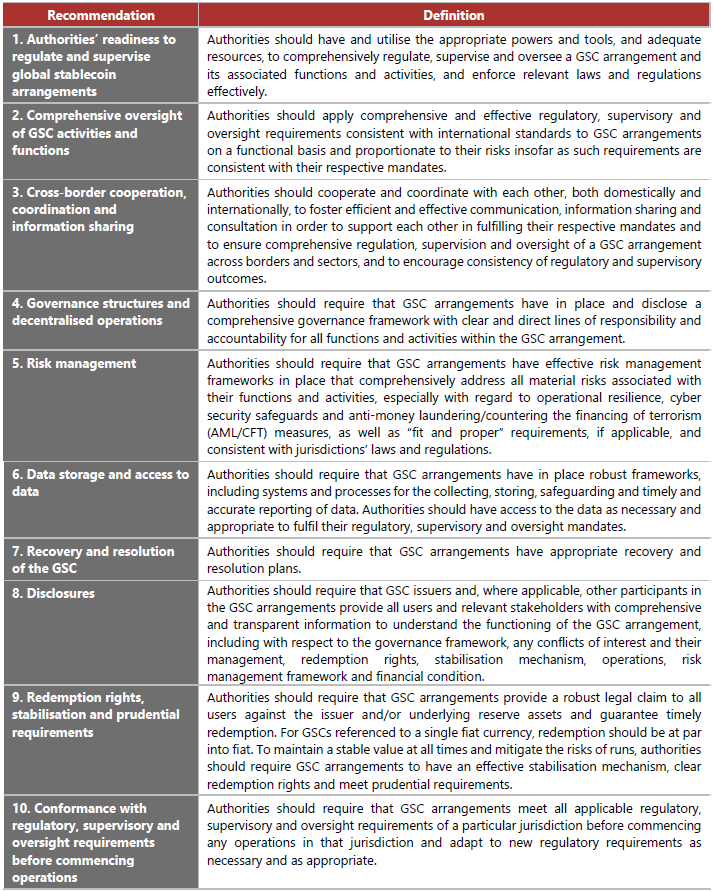Recommendations for the Regulation, Supervision and Oversight of Global Stablecoin Arrangements - Executive Summary
Stablecoins, like other cryptoassets, have the potential to enhance the efficiency of how financial services are provided, but they may also generate risks to financial stability. A widely adopted stablecoin with a potential reach and use across multiple jurisdictions, referred to as a "global stablecoin" (GSC), could become systemically important in and across one or many jurisdictions. The activities associated with GSC arrangements and the risks they may pose can span across regulatory regimes for banking, payments and securities/investment both within jurisdictions and across borders. While such financial stability risks are currently limited by the relatively small scale of these arrangements, this could change in the future.
In response, in 2019, the Group of Twenty (G20) mandated the Financial Stability Board (FSB) to examine regulatory issues raised by GSC arrangements and to advise on multilateral responses as appropriate. Subsequently, in October 2020, the FSB published High-level Recommendations for the Regulation, Supervision and Oversight of Global Stablecoin Arrangements. After a review, the FSB published a final version in July 2023 as part of its global regulatory framework for cryptoasset activities.
Global stablecoins
The term "stablecoin" has no universally agreed legal or regulatory definition, and it is not intended to imply that its value is stable. The FSB uses the term because market participants and authorities commonly use it. The 2023 FSB final report provides the following definitions:
- Stablecoin: a cryptoasset that aims to maintain a stable value relative to a specified asset, or a pool or basket of assets
- Stablecoin arrangement: an arrangement that combines a range of functions (and related activities) that aims to maintain a stable value relative to a specified asset, or a pool or basket of assets
- Global stablecoin (GSC): a stablecoin with an existing or potential reach and use across multiple jurisdictions and that could become systemically important in and across one or many jurisdictions, including as a means of making payments and/or as a store of value
Key features in the determination of whether a stablecoin qualifies as a GSC are (i) whether financial or operational disruptions in its arrangement, or its failure, could have a material impact on cryptoasset markets, the global financial system and the wider economy and (ii) its potential uses in multiple jurisdictions.
Relevant additional features can be developed on the basis of criteria that are often considered in determining the need for, or degree of, regulation, supervision and oversight of financial market infrastructures and global systemically important banks. In this context, it matters whether a stablecoin has the potential to expand reach and adoption across multiple jurisdictions and to achieve substantial volume.
The high-level recommendations for GSC arrangements
The high-level GSC recommendations aim to address financial stability risks posed by GSCs, both at the domestic and international level, while supporting responsible innovation and providing sufficient flexibility for jurisdictions to implement domestic approaches. They seek to promote consistent and effective regulation, supervision and oversight of GSCs and stablecoins with the potential to become GSCs across jurisdictions. In addition, these recommendations emphasise a technology-neutral approach that prioritises underlying activities and risks.

This Executive Summary and related tutorials are also available in FSI Connect, the online learning tool of the Bank for International Settlements.
